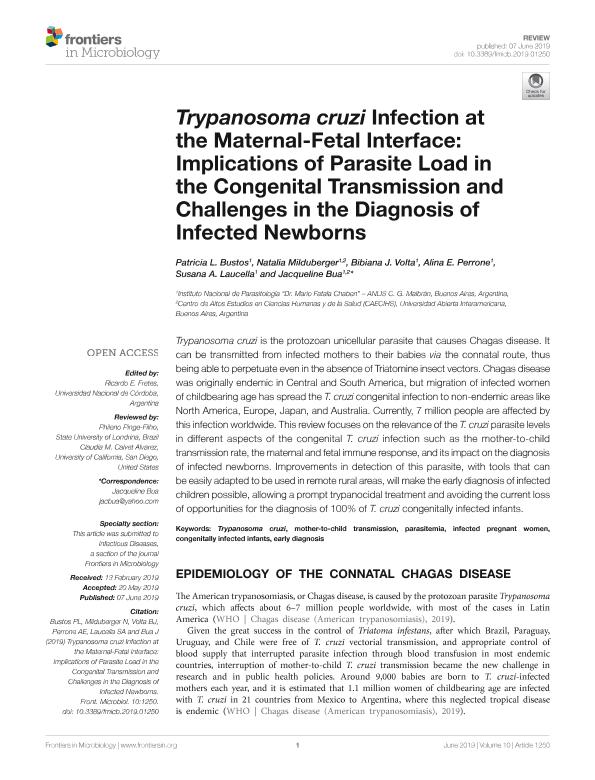Artículo
Trypanosoma cruzi infection at the maternal-fetal interface: Implications of parasite load in the congenital transmission and challenges in the diagnosis of infected newborns
Bustos, Patricia Laura ; Milduberger, Natalia Ayelen; Volta, Bibiana Julieta
; Milduberger, Natalia Ayelen; Volta, Bibiana Julieta ; Perrone, Alina Elizabeth
; Perrone, Alina Elizabeth ; Laucella, Susana Adriana
; Laucella, Susana Adriana ; Bua, Jacqueline Elena
; Bua, Jacqueline Elena
 ; Milduberger, Natalia Ayelen; Volta, Bibiana Julieta
; Milduberger, Natalia Ayelen; Volta, Bibiana Julieta ; Perrone, Alina Elizabeth
; Perrone, Alina Elizabeth ; Laucella, Susana Adriana
; Laucella, Susana Adriana ; Bua, Jacqueline Elena
; Bua, Jacqueline Elena
Fecha de publicación:
07/06/2019
Editorial:
Frontiers Media S.A.
Revista:
Frontiers in Microbiology
e-ISSN:
1664-302X
Idioma:
Inglés
Tipo de recurso:
Artículo publicado
Clasificación temática:
Resumen
Trypanosoma cruzi is the protozoan unicellular parasite that causes Chagas disease. It can be transmitted from infected mothers to their babies via the connatal route, thus being able to perpetuate even in the absence of Triatomine insect vectors. Chagas disease was originally endemic in Central and South America, but migration of infected women of childbearing age has spread the T. cruzi congenital infection to non-endemic areas like North America, Europe, Japan, and Australia. Currently, 7 million people are affected by this infection worldwide. This review focuses on the relevance of the T. cruzi parasite levels in different aspects of the congenital T. cruzi infection such as the mother-to-child transmission rate, the maternal and fetal immune response, and its impact on the diagnosis of infected newborns. Improvements in detection of this parasite, with tools that can be easily adapted to be used in remote rural areas, will make the early diagnosis of infected children possible, allowing a prompt trypanocidal treatment and avoiding the current loss of opportunities for the diagnosis of 100% of T. cruzi congenitally infected infants.
Archivos asociados
Licencia
Identificadores
Colecciones
Articulos(SEDE CENTRAL)
Articulos de SEDE CENTRAL
Articulos de SEDE CENTRAL
Citación
Bustos, Patricia Laura; Milduberger, Natalia Ayelen; Volta, Bibiana Julieta; Perrone, Alina Elizabeth; Laucella, Susana Adriana; et al.; Trypanosoma cruzi infection at the maternal-fetal interface: Implications of parasite load in the congenital transmission and challenges in the diagnosis of infected newborns; Frontiers Media S.A.; Frontiers in Microbiology; 10; 1250; 7-6-2019; 1-9
Compartir
Altmétricas



